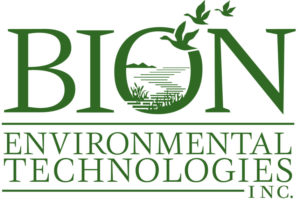May 10, 2021
Bion seeks OMRI certification for solid version of manure-based fertilizer
Bion Environmental Technologies, Inc. recently announced that it has submitted a new application to the Organic Materials Review Institute seeking an OMRI listing for the crystallized ammonium bicarbonate/ ammonium carbonate recovered in its third generation waste treatment platform.
 An earlier, liquid, version of the product is already approved. Bion’s new solid crystalline product is called AD Nitrogen.
An earlier, liquid, version of the product is already approved. Bion’s new solid crystalline product is called AD Nitrogen.
In a news release, Bion said its initial OMRI application for a liquid ammonium bicarbonate solution, was approved for OMRI Listing in May 2020, confirmed that “Bion’s 3G technology platform produces organic-compliant nitrogen fertilizer with a non-synthetic process.” Bion’s patented
third-generation technology platform was developed to allow naturally occurring ammonium compounds in the waste stream to be captured and upcycled into a solid, readily available, nitrogen fertilizer.
“Bion was notified by OMRI last week that several application restrictions placed on the initial product listing have been removed following a review and clarification of our original application,” Craig Scott, Bion’s director of communications, said in the news release. “This will provide end-users with more opportunity and flexibility for field applications. Bion anticipates future products listed with OMRI will no longer include manure-related application restrictions.”
AD Nitrogen, Bion’s new solid crystalline product that is the subject of the current OMRI application, is a concentrated and dewatered form of the previously approved liquid product, according to the news release. A dry, water-soluble ammonium bicarbonate offers several advantages over a liquid nitrogen product, Bion said. A dry bagged product has much less weight and volume than a liquid product; therefore, fuel and handling costs to transport to the product blender are significantly lower, as is its carbon footprint. A dry bagged product can be stored and handled much easier than a liquid; and, because it is water-soluble, it is easily diluted to its ultimate application rate. As a commercial product, a dry ammonium bicarbonate is more versatile than the liquid and is expected to appeal to both liquid and solid blenders.
Stabilizing the highly volatile and mobile nitrogen in the ammonium compounds that form Bion’s AD Nitrogen product, results in substantial improvements to the environment, including both air and water quality, as well as soil health, according to the news release. A substantial portion of the volatile nitrogen will no longer be available to escape to contribute to formation of PM2.5 (small particulate air pollution), leach into groundwater, or run off to feed downstream algae blooms and dead zones that U.S. EPA calls one of the greatest water quality problems in the country today. Further, by decoupling the nitrogen from the phosphorus in the manure, those nutrients can now be precision applied independently and at an appropriate agronomic rate to maintain the proper nutrient balance in the soil.
“Bion’s AD Nitrogen product represents a win-win for agriculture, the environment and the consumer,” Scott said. “A readily available, cost-effective, and convenient non-synthetic nitrogen product will increase the efficiency of organic crop production by narrowing the ‘yield gap’ associated with it and help fuel expansion of what is already the fastest growing segment of American agriculture.”
One final, but important note: according to their website, OMRI is much busier today than it was when Bion applied for its initial listing last year, which was approved quickly. It is reasonable to assume that a decision will take longer this time.”
Bion’s patented third-generation technology was designed to substantially reduce the environmental impacts of large-scale livestock production and deliver a USDA-certified sustainable product to the consumer, according to the news release.






